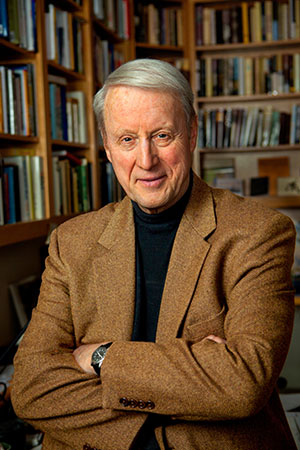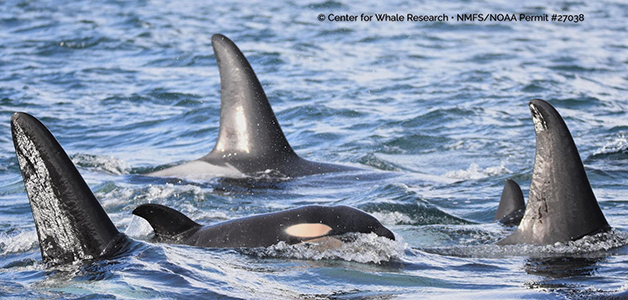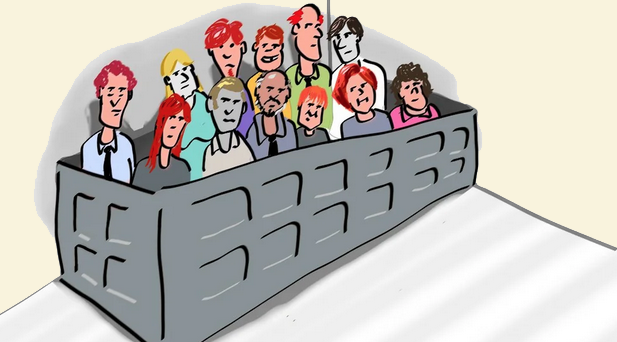Friday, July 28 at p.m. at 7 p.m. at Orcas Center
— by Margie Doyle —

Hedirck Smith, NY Times reporter, Frontline producer and founder of Reclaim the American Dream (reclaimtheamericandream.org)
Hedrick Smith, an innovator as well as an institution in journalism, will speak as an Orcas Currents Lecturer, along with Sarah Stillman, a writer for the New Yorker magazine, at Orcas Center on Friday, July 28.
In an interview with Orcas Issues, “Rick” Smith previewed his topic, “The Future of Journalism in a Post-Truth Environment” and, as is typical of the founder of the movement Reclaim the American Dream — It’s Up to Us,” he is heavy on hope and solutions. “My concern is with news and what terms such as ‘fake news’ mean, what the current reality is, and the rising excellence of the media,” he says.
It may seem ironic that even as journalism and the media are blasted by the President as “fake news” and politically-motivated, Smith is encouraged by journalism’s response. He succinctly puts it:
- Journalism is about getting evidence and assembling facts
- News is fact-based, not fake
- Fake is fiction
- ‘Fake News’ is an oxymoron
“There is some great journalism today: holding government accountable and exposing the political and economic reality all over the country,” he says. For example, he cites the recent PBS series on communities in Utah, West Virginia, and other states supportive of Republicans in the 2016 election, and what would it mean to them if the Affordable Care Act (Obamacare) was repealed?
While immediately adding that Obamacare absolutely needs improvement, he says, “Dumping national [health] is now opposed by 55 percent of public — in the 2016 campaign it was exactly the opposite — 55 percent of the public was in favor of dumping Affordable Care.
“Paul Ryan in the House and Mitch McConnell in the Senate are determined to ‘junk’ Affordable Care and that has enlivened the press to report it. And the public is getting educated.
“That’s what democracy is all about.”
“In an era of ‘fake news,’ fact-checking is now fashionable,” Smith says. “And that’s a good change. It makes our role as journalists all the more important today in an atmosphere of acid politics and turmoil.” Smith cites the root cause of the polarity and obstruction as income inequality and resultant middle class resentment.
The President “verbalized their insecurity and loss of faith. There is massive resentment towards ‘the elites,’ including leadership and the media. People are taking it out in an almost unthinking way, based on their experience. The inequity now — political, economic, cultural — just can’t go on.
“There is real heartache in the belly of America,” Smith says, “and we need to be concerned on how we can fix democracy.”
He maintains that journalism is better since the “explosion of fake news – an oxymoron – than it was before.” He explains his use of the term “fake news:” “It’s not just news you don’t agree with, but fabricated information. That really broke through [traditional] news with the 2016 campaign. Then Russians, and other nationals, but the Russians had thousands of fake sites — not just oppositional, but literally made up.”
[perfectpullquote align=”right” cite=”” link=”” color=”” class=”” size=””]”Your opinions must be buttressed by a basis in fact.”[/perfectpullquote]
It benefits the President’s claims by “disrupting the public’s faith in media,” Smith says. “People have gotten confused with the news and don’t like news when it’s from the ‘other side.’ But news is about facts: describing economic, social, political reality so that people can respond in their public and personal life. The business about opinions is secondary to getting the facts — opinions are something else, but they, too, have to be of themselves fact-based.
“Your opinions must be buttressed by a basis in fact.”
Smith explains the “relentless attack on the media” in saying, “Presidents attack the media when they’re in trouble — it’s happened with Kennedy, Johnson, Nixon. “Our fear is we have a president who first and foremost is dedicated to himself, not to the country. It heightens our anxiety that he is not committed to the Constitution.”
“I think the explosion of fake news is deliberately fabricated; principally on behalf of Russia.”
He again refers to the “rising excellence of media: The press has been envigorated, there is first-class reporting, journalists are performing well and people are responding. They’ve rediscovered they have an appetite and a need for top quality, fact-based news that is encouraging and essential to the functioning of our democracy.
[perfectpullquote align=”right” cite=”” link=”” color=”” class=”” size=””] “I think the explosion of fake news is deliberately fabricated; principally on behalf of Russia.” [/perfectpullquote]
“The good news is that a healthy, active, vibrant press is committed to serving the pubic and holding government officials accountable.
“How the public responds is another question,” Smith said.
“But journalists are returning to the gut job of what’s going on and what’s behind the scenes – a healthy development.”
Smith and Stillman’s presentation will be moderated by Floyd McKay, journalism professor emeritus from Western Washington University at the Orcas Currents Lecture on July 28 at Orcas Center at 7 p.m. Donations are welcome.
**If you are reading theOrcasonian for free, thank your fellow islanders. If you would like to support theOrcasonian CLICK HERE to set your modestly-priced, voluntary subscription. Otherwise, no worries; we’re happy to share with you.**









Rick, you are an Island Treasure. I’m proud to consider you a neighbor, if only part time.